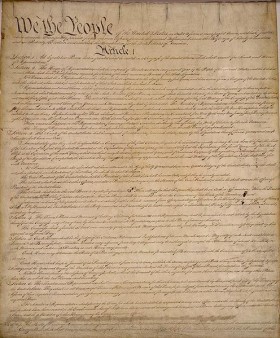 I introduced the topic of legal interpretative theory here and began the discussion of one of the views, Textualism, here. I have explained that victories in Cannabis reform are threatened by Living Document Theory (LDT), and I have introduced the standard that I think we should use, Textualism. Now I wish to explain some more of the background of LDT and highlight more of the dangers to Cannabis legalization efforts.
I introduced the topic of legal interpretative theory here and began the discussion of one of the views, Textualism, here. I have explained that victories in Cannabis reform are threatened by Living Document Theory (LDT), and I have introduced the standard that I think we should use, Textualism. Now I wish to explain some more of the background of LDT and highlight more of the dangers to Cannabis legalization efforts.
Living Document Theory has been around for about 100 years. It was created to get around the Amendment process of the Constitution, which advocates like President Woodrow Wilson thought hindered progress, or at least their version of progress. It meant instead of taking the time and effort of convincing the majority of America that their ideas were right, they felt it would just be easier to tell judges that the words of the law didn’t matter. Wilson and others felt that judges should use “evolving circumstances,” and not the wording of the law.
It was a bad idea at the time and judges should have replied to advocates like Wilson that when the circumstances evolve, the people can change the law, but until they do here, is the ruling based on the facts and their application to the law.
But how it came about, or why it came about, isn’t really relevant. I don’t really care about the moral or ethical reasons they used to justify that it was a good idea. It isn’t some Communist plot, or a scheme thought up by the Bilderbergs, it is merely sloppy thinking and the inability to see the contradiction in its core idea. The Constitution is a restraint on government. If the words on the page do not matter, then law stops being a restraint on anything and instead merely becomes the power of force moved by the whim of the majority, and no person or party is always going to be in the majority.
Prohibition of Alcohol began and ended with Constitutional Amendments. Prohibition of Cannabis has no Amendment, so where does the Federal Government derive the Authority to prohibit it? Under a Textualist reading, there is no Authority. Under the 10th Amendment, it is a State decision (i.e., each state has the power to decide if cannabis is legal in its borders). Under a Living Document Theory, the Federal Government merely needs to convince 5 Judges that, as an example, the evolving circumstances of an endangered citizenry allows it to prohibit all sorts of things, from cannabis to speech.
The legal and policy questions of ‘what will the Federal Government do now that two more states have passed their laws’ shouldn’t even come up, and would not have come up absent the LDT.
Living Document would make even an Amendment to the Constitution’s existence ephemeral, since what good are new words on the page when you don’t have to follow the words there now?
As long as this Legal Theory is held by the dominant political party, no victory towards ending cannabis is secure. Weedists should demand that their government be obliged to follow the law. When the government itself is advocating Living Document, it is telling you that it is no longer restrained. It can do whatever it wants, regardless of whatever silly laws, referendums or amendments you make. I firmly believe this country has a long road ahead in terms of fixing the laws on cannabis, but weedists need to make sure the foundations are secure on whatever victories they achieve. Living Document erodes those foundations.









